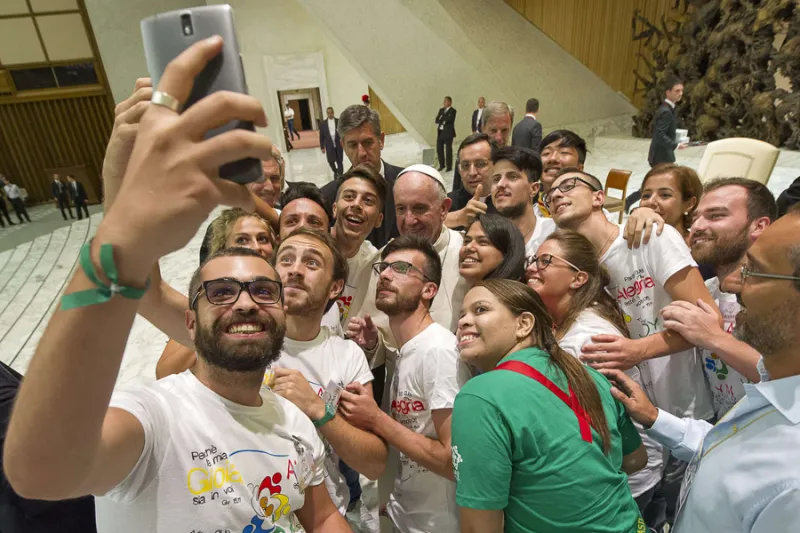
Cardinal Gregory, young Catholic leaders to dialogue about humanitarian crises, racism, and solidarity
 Pope Francis takes a selfie with members of International Eucharistic Youth Movement in Paul VI Hall on Aug 7, 2015. / L’Osservatore Romano
Pope Francis takes a selfie with members of International Eucharistic Youth Movement in Paul VI Hall on Aug 7, 2015. / L’Osservatore Romano
Washington D.C., Oct 7, 2021 / 14:05 pm (CNA).
Tonight, the Initiative on Catholic Social Thought and Public Life at Georgetown University will host the first of a three-part dialogue series for young adults on Fratelli tutti, Pope Francis’ encyclical on fraternity and social friendship. The first session, “Who is My Neighbor,” will focus on the humanitarian crises in Afghanistan and Haiti, as well as systemic racism in the United States.
The series, which came about at the request of Pope Francis by way of the USCCB and Archbishop Jose Gomez, is designed to engage young adults in conversation around the topic of solidarity with their neighbors, both in the U.S. and abroad. The first dialogue will wrap up with a call-to-action for participants to consider the question, “Who is my neighbor?”
“What’s one thing the young adults listening can do to practice what Pope Francis teaches us in Fratelli tutti to support our sisters and brothers, whether they’re our next door neighbors, or whether they’re in Afghanistan or Haiti?” said Anna Gordon, project manager for the Initiative on Catholic Social Thought and Public Life. “We’re hoping that people will leave the conversation feeling inspired to act on the message of Fratelli tutti.”
The core of the initiative’s mission, Gordon said, is to bring young leaders together to talk about how their faith impacts the world. The initiative has been around for more than eight years, and it works closely with the Archdiocese of Washington on community initiatives.
The dialogue will include four parts: a brief overview of the topic and a welcome from Cardinal Wilton Gregory, Archbishop of Washington; a discussion on the general themes of Fratelli tutti, led by two of the participants along with the cardinal; examples of what it means to be a neighbor in Washington, Haiti, and Afghanistan; and a time for questions and answers.
“A big focus will be talking about what the role of social friendship and solidarity means when there are these humanitarian crises happening,” Gordon said. “We’re talking about global solidarity, but also what does solidarity look like in our own backyard.”
The panelists for the first dialogue are Muzhgan Azizy, a recent refugee from Afghanistan; Juan Aznaran, partnerships manager for the Newcomer Network of Catholic Charities in the Archdiocese of Washington; Omayma El Ella, project associate for the Just and Inclusive Society Project at Democracy Fund; Reynold Hyppolite, head of youth programming for Catholic Relief Services in Haiti; Gerald Smith, Jr., a Catholic school principal in Washington, D.C.; and Cardinal Gregory.
“We have such rich and diverse viewpoints and perspectives,” Gordon said. “They all have such wonderful things to share about their work, their lives, and how they’ve been seen as a neighbor and how people have reached out to them as neighbors.”
“Despite the newsreel that we see on our phones, the constant, what seems like, negative news, these participants are giving us glimpses of what it really means to be a neighbor in a time of global humanitarian crises, racism, and the pandemic,” Gordon said.
Though encouraged, RSVPs are not required to participate in the series. The dialogue, an extension of the Theology on Tap programs of the Archdiocese of Washington, will be livestreamed on YouTube, Facebook, and Twitter at 7 p.m. EDT.
“I hope it challenges the people watching to dream and to hope, and to really reach out to their neighbors and ask, ‘Who is my neighbor in my life?’ and ‘How can I be a better neighbor to everyone that I meet?’” Gordon said.
The next two dialogues in the series will be held Nov. 4 and Dec. 2.

